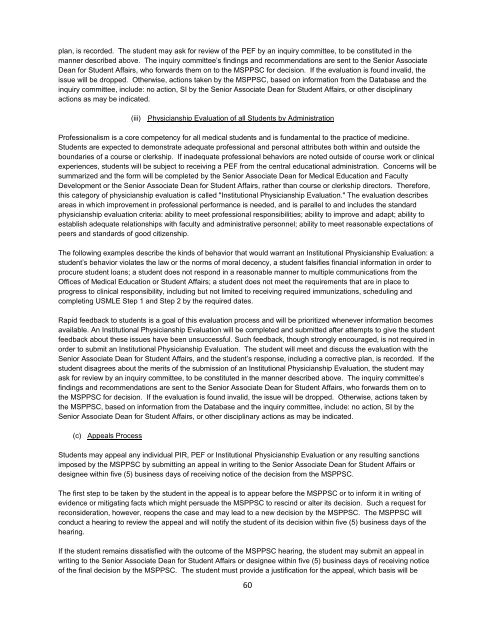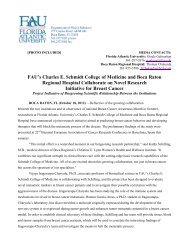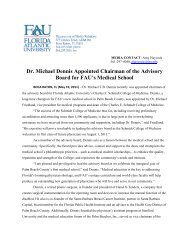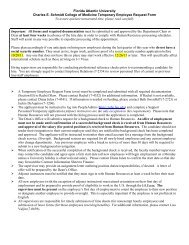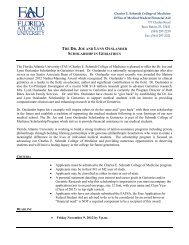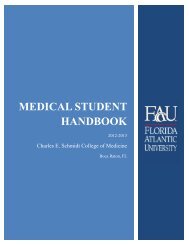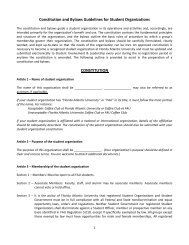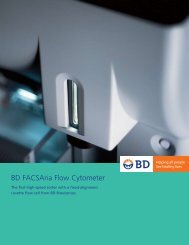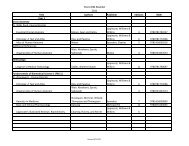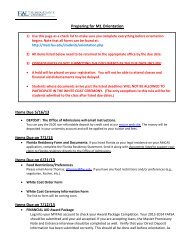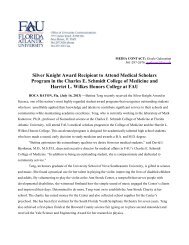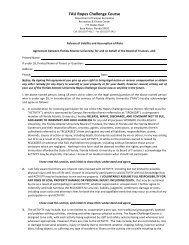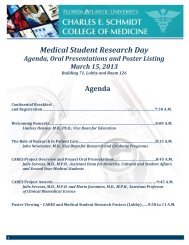Student Handbook - College of Medicine - Florida Atlantic University
Student Handbook - College of Medicine - Florida Atlantic University
Student Handbook - College of Medicine - Florida Atlantic University
You also want an ePaper? Increase the reach of your titles
YUMPU automatically turns print PDFs into web optimized ePapers that Google loves.
plan, is recorded. The student may ask for review <strong>of</strong> the PEF by an inquiry committee, to be constituted in themanner described above. The inquiry committee’s findings and recommendations are sent to the Senior AssociateDean for <strong>Student</strong> Affairs, who forwards them on to the MSPPSC for decision. If the evaluation is found invalid, theissue will be dropped. Otherwise, actions taken by the MSPPSC, based on information from the Database and theinquiry committee, include: no action, SI by the Senior Associate Dean for <strong>Student</strong> Affairs, or other disciplinaryactions as may be indicated.(iii) Physicianship Evaluation <strong>of</strong> all <strong>Student</strong>s by AdministrationPr<strong>of</strong>essionalism is a core competency for all medical students and is fundamental to the practice <strong>of</strong> medicine.<strong>Student</strong>s are expected to demonstrate adequate pr<strong>of</strong>essional and personal attributes both within and outside theboundaries <strong>of</strong> a course or clerkship. If inadequate pr<strong>of</strong>essional behaviors are noted outside <strong>of</strong> course work or clinicalexperiences, students will be subject to receiving a PEF from the central educational administration. Concerns will besummarized and the form will be completed by the Senior Associate Dean for Medical Education and FacultyDevelopment or the Senior Associate Dean for <strong>Student</strong> Affairs, rather than course or clerkship directors. Therefore,this category <strong>of</strong> physicianship evaluation is called "Institutional Physicianship Evaluation." The evaluation describesareas in which improvement in pr<strong>of</strong>essional performance is needed, and is parallel to and includes the standardphysicianship evaluation criteria: ability to meet pr<strong>of</strong>essional responsibilities; ability to improve and adapt; ability toestablish adequate relationships with faculty and administrative personnel; ability to meet reasonable expectations <strong>of</strong>peers and standards <strong>of</strong> good citizenship.The following examples describe the kinds <strong>of</strong> behavior that would warrant an Institutional Physicianship Evaluation: astudent’s behavior violates the law or the norms <strong>of</strong> moral decency, a student falsifies financial information in order toprocure student loans; a student does not respond in a reasonable manner to multiple communications from theOffices <strong>of</strong> Medical Education or <strong>Student</strong> Affairs; a student does not meet the requirements that are in place toprogress to clinical responsibility, including but not limited to receiving required immunizations, scheduling andcompleting USMLE Step 1 and Step 2 by the required dates.Rapid feedback to students is a goal <strong>of</strong> this evaluation process and will be prioritized whenever information becomesavailable. An Institutional Physicianship Evaluation will be completed and submitted after attempts to give the studentfeedback about these issues have been unsuccessful. Such feedback, though strongly encouraged, is not required inorder to submit an Institutional Physicianship Evaluation. The student will meet and discuss the evaluation with theSenior Associate Dean for <strong>Student</strong> Affairs, and the student’s response, including a corrective plan, is recorded. If thestudent disagrees about the merits <strong>of</strong> the submission <strong>of</strong> an Institutional Physicianship Evaluation, the student mayask for review by an inquiry committee, to be constituted in the manner described above. The inquiry committee’sfindings and recommendations are sent to the Senior Associate Dean for <strong>Student</strong> Affairs, who forwards them on tothe MSPPSC for decision. If the evaluation is found invalid, the issue will be dropped. Otherwise, actions taken bythe MSPPSC, based on information from the Database and the inquiry committee, include: no action, SI by theSenior Associate Dean for <strong>Student</strong> Affairs, or other disciplinary actions as may be indicated.(c) Appeals Process<strong>Student</strong>s may appeal any individual PIR, PEF or Institutional Physicianship Evaluation or any resulting sanctionsimposed by the MSPPSC by submitting an appeal in writing to the Senior Associate Dean for <strong>Student</strong> Affairs ordesignee within five (5) business days <strong>of</strong> receiving notice <strong>of</strong> the decision from the MSPPSC.The first step to be taken by the student in the appeal is to appear before the MSPPSC or to inform it in writing <strong>of</strong>evidence or mitigating facts which might persuade the MSPPSC to rescind or alter its decision. Such a request forreconsideration, however, reopens the case and may lead to a new decision by the MSPPSC. The MSPPSC willconduct a hearing to review the appeal and will notify the student <strong>of</strong> its decision within five (5) business days <strong>of</strong> thehearing.If the student remains dissatisfied with the outcome <strong>of</strong> the MSPPSC hearing, the student may submit an appeal inwriting to the Senior Associate Dean for <strong>Student</strong> Affairs or designee within five (5) business days <strong>of</strong> receiving notice<strong>of</strong> the final decision by the MSPPSC. The student must provide a justification for the appeal, which basis will be60


